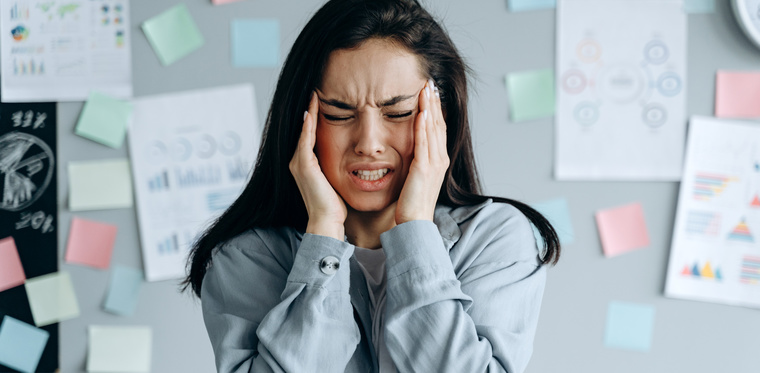
How Cannabis Can Help Relieve a Caffeine Headache?
There is no doubt that caffeine is one of the most popular psychoactive substances on earth. There are many types of caffeine that come from various sources. The one most people know about is coffee. But there are also other sources of caffeine such as tea leaves, soda, energy drinks, and chocolate. Caffeine is also found in some OTC medications, such as pain relievers, cold & flu capsules, and headache medicines.
When you use caffeine, your body becomes dependent on it to stay awake and active throughout the day. If you ever forget your coffee or tea in the morning and don’t consume enough caffeine, your body will experience withdrawal symptoms that include headaches. It’s funny how caffeine can be used to treat headaches and at the same time cause headaches when abruptly stopped following regular use or when taken in excess.
We aim to shed light on this confusing subject in this article as well as determine whether cannabis would benefit caffeine headache victims and, if yes, in what ways.
Caffeine and Headaches
Caffeine is a central nervous system stimulant of the methylxanthine class. Caffeine blocks the activity of adenosine, a neurotransmitter in the brain. As an inhibitory neurotransmitter, adenosine causes drowsiness and sleep by slowing down the nervous system. Caffeine inhibits adenosine from acting normally, resulting in increased alertness, energy, and focus.
It's for this reason that caffeine is widely used globally to keep people going and awake. It is well known as a recreational substance for mild stimulation. Many people use caffeine to boost their performance and energy, especially after hours of studying or working.
But when taken in excess, the body begins to build up a tolerance to caffeine, so the effects of caffeine can start to cause negative side effects. Common side effects of excess consumption of caffeine include:
- Insomnia
- Dizziness
- Restlessness
- headaches
- Anxiety
- Increased heart rate
- tremors
Similarly, when you consume too much caffeine, your body becomes dependent on the substance. For this reason, when you suddenly stop the consumption of the compound, your body experiences withdrawal symptoms that are no different from the ones listed above. Additional caffeine withdrawal symptoms include:
- Fatigue
- Nausea
- Constipation
- Irritability
- Difficulty concentrating
- Drowsiness
- Changes in blood pressure
- Muscle and joint pain
- Abdominal pain
Many people start to feel the effects of caffeine withdrawal between 12 and 24 hours after their last intake of the substance. The peak symptoms occur between 20 and 51 hours and can last for an average of 2–9 days.
It's estimated that up to 50% of people who abruptly reduce their caffeine consumption will experience headaches. A good number of people will also experience this symptom after excessive caffeine consumption.
On the good side, though, caffeine is a psychoactive compound, which means that it affects mental functions such as mood, memory, alertness, learning, and behavior. When consumed in low doses, it can help relieve headaches as well.
Caffeine can also be found in some pharmaceutical drug preparations, especially in painkillers, as they increase their effectiveness. In most cases, caffeine is used in combination with acetaminophen or NSAIDs medications such as ibuprofen. As long as it's used appropriately and in moderation, caffeine can enhance the efficacy of these preparations and counter side effects such as drowsiness.
Headaches can be debilitating. But “rebound” headaches are the worst experience because they seem to last forever! They usually occur when we take too many over-the-counter headaches for too long or stop taking them abruptly. The same explanation for caffeine causing headache after excess consumption or after withdrawal apply here.
Due to this, health experts recommend only using headache drugs for a maximum of 2–3 days a week. Reducing your intake of caffeine slowly can also help prevent headaches and related side effects.

Why Does Caffeine Cause Headaches?
It's no surprise that caffeine can cause and alleviate headaches for many people. But how exactly does this occur? Caffeine interacts with adenosine receptors in the brain and causes blood vessels to dilate. This allows blood to flow more freely in the body. But, this only occurs in less frequent caffeine users. Those who are regular caffeine users actually see a reverse effect.
Abnormal blood vessel dilation and constriction is widely thought to play a role in some types of headaches and migraines. Thus, caffeine could play a role in their cause and treatment.
Coffee is a daily ritual for many who consume it. It’s usually the first thing they do to start their day and the last thing they do before falling asleep at night. But how much should you drink?
According to the FDA, 400 milligrams a day is the amount of caffeine that is not usually associated with harmful, negative effects for a healthy adult. 400 mg is approximately four or five cups of coffee, or two energy drinks, or ten cans of soda every day. Although the average American consumes around 280 mg of caffeine a day, there is a high chance you could consume too much!
Cannabis for Headaches
Cannabis is known as a great, all-natural painkiller used to remedy headaches, anxiety, and even depression. Its history as a pain remedy and also as a great treatment for nausea, vomiting, and muscle spasms is well known. Cannabis was extensively used for these medicinal purposes until 1937 when the Marihuana Tax Act made its unregulated use illegal.
Cannabis was first recorded as a remedy for headaches in Assyrian manuscripts dated to the second millennium BCE.
The ancient Indians, Arabs, and Persians used marijuana as a headache cure as well. The plant's medical benefits were recognized by European herbalists from the late middle Ages until the early 20th century, when popular opinion turned against it.
Today, there is a growing awareness that marijuana isn't the dangerous, demonized plant it once was. The plant is experiencing renewed popularity as a natural remedy that is being utilized for a variety of medical purposes.
Though there is no definite scientific evidence that cannabis can treat headaches, some people report experiencing relief after using the drug. Additionally, anecdotal reports suggest that using cannabis could alleviate both migraines and headaches.
The way cannabis relieves headaches is not fully understood, but one theory about the endocannabinoid system is so promising.
The Endocannabinoid System and Headaches
The endocannabinoid system is a network of cell receptors and their corresponding endocannabinoid molecules that exist in the brain and in other parts of the body. Endocannabinoids interact with the endogenous cannabinoid receptors present on the surface of neurons, causing a range of effects on the body, including the circulatory and nervous systems.
Endocannabinoids regulate blood vessel dilation and constriction in your circulatory system, meaning they have a relatively similar effect to caffeine.
By influencing the release of neurotransmitters in the nervous system, endocannabinoids can affect mood, stress adaptation, immune responses, temperature regulation, perception of pain, and motor learning.
In spite of the fact that we still don’t understand exactly how the endocannabinoid system contributes to headaches, there is a possibility that headaches and migraines could be caused by endocannabinoid deficiency. In this case, cannabis may be helpful.
The receptors activated by endocannabinoids can also be triggered by phytocannabinoids such as THC and CBD present in cannabis. Consequently, cannabis is expected to have similar effects on blood vessels and neural cells, just like endocannabinoids.
In order to determine exactly what effect cannabis has on headaches, more research is needed. But for now, it does seem to work on some people.
Many phytocannabinoids (plant-based cannabinoids) have been studied for their interactions with the endocannabinoids system. THC, CBD, and CBN are all compounds that have been extensively studied for their interactions with the endocannabinoid system.
How to Use Cannabis for Caffeine Headaches
Have you ever had a pounding headache that wouldn’t go away? Well, it can get pretty frustrating. If you find yourself in this boat, then you may want to consider trying something more potent like cannabis. Marijuana might be beneficial for caffeine headaches on three different levels.
The first benefit would be to directly alleviate headaches and other related symptoms such as anxiety, nausea, or joint/muscle pain due to caffeine withdrawal. CBD-rich strains, as well as those rich in THC (hybrid strains), are the best choices in this case. Harlequin and ACDC are examples of strains with high CBD levels.
Second, certain cannabis strains may offer an alternative energy boost for people who want to cut down on caffeine. The strains you should choose for this purpose are the ones that stimulate and energize you. Perfect examples are Green Crack or Sour Diesel.
In order to minimize the risk of withdrawal symptoms, it's recommended that you decrease your caffeine intake gradually. It's recommended that you reduce your caffeine intake by around 25% per week.
Marijuana is a natural remedy for pain. The active ingredients in cannabis: delta-9-tetrahydrocannabinol (THC) and cannabidiol (CBD), are responsible for the pain relief effect. So the last way it can be used to treat caffeine headaches is by swapping it with caffeine-containing painkillers.
With the herb, you may be able to gradually reduce your use of these medications and still have control of your symptoms. There are several strains that are particularly effective for headaches and migraines, such as White Widow, OG Kush, and Northern Lights.
To get the most benefits from cannabis, it's not only important to choose the right strain but also to consume it properly.
To relieve the sudden onset of headaches fast, smoking or vaping should be your go-to weed consumption method. If you consume cannabis orally through tinctures, oils, or edibles, its effects are much slower to kick in. Nevertheless, they continue to work for a longer time, indicating that they are better suited as long-term relief and prevention solutions.
As with any medical treatment or therapy, there are risks and benefits associated with using cannabis as a pain reliever. Some of the more common ones include feeling anxious or paranoid, dizziness, dry mouth, and dry eyes.
It's definitely not wise to replace caffeine with cannabis and then suffer in a totally different manner. Thus, it's essential to assess the benefits and risks of all the two options to determine which will provide the greatest relief with the least adverse consequences.

Can Cannabis Help Treat Caffeine Headaches? Final Thoughts
It's true that cannabis may help alleviate or reduce caffeine headaches, but if you don't use it responsibly, you might put yourself at risk by simply substituting one substance for another. What's more, if you smoke weed every time you want coffee, you could get into trouble at work or even become incapable of completing your daily tasks.
In a nutshell, cannabis can be a substitute for caffeine but for the short term. Although how the two substances work is somehow related, it’s not advisable to swap one substance for the other abruptly or for long-term purposes. Also, it would be best if you understood that even though cannabis and caffeine do share some similarities, they are not the same thing. So, while cannabis may treat your headaches, it won't eliminate your need for coffee in the morning.
If you are experiencing chronic migraine or headache symptoms and want to swap your conventional painkillers with marijuana, you should consult your doctor beforehand. In addition to giving you advice on how to do the swap safely, the doctor will advise you on the proper cannabis dosage for you and how to consume it.


.png)